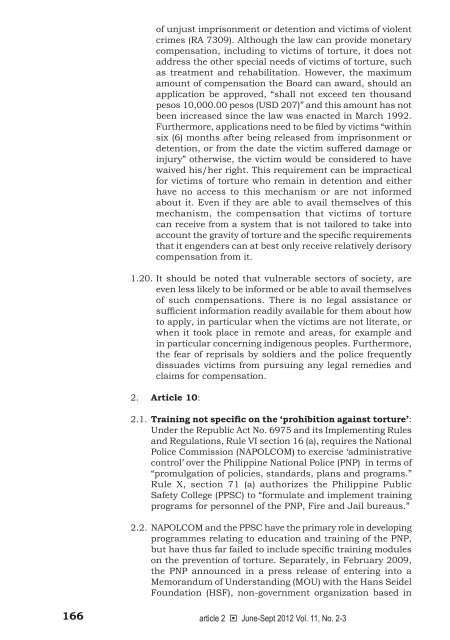Create successful ePaper yourself
Turn your PDF publications into a flip-book with our unique Google optimized e-Paper software.
166<br />
of unjust imprisonment or detention and victims of violent<br />
crimes (RA 7309). Although the law can provide monetary<br />
compensation, including to victims of torture, it does not<br />
address the other special needs of victims of torture, such<br />
as treatment and rehabilitation. however, the maximum<br />
amount of compensation the Board can award, should an<br />
application be approved, “shall not exceed ten thousand<br />
pesos 10,000.00 pesos (uSD 207)” and this amount has not<br />
been increased since the law was enacted in march 1992.<br />
Furthermore, applications need to be filed by victims “within<br />
six (6) months after being released from imprisonment or<br />
detention, or from the date the victim suffered damage or<br />
injury” otherwise, the victim would be considered to have<br />
waived his/her right. This requirement can be impractical<br />
for victims of torture who remain in detention and either<br />
have no access to this mechanism or are not informed<br />
about it. Even if they are able to avail themselves of this<br />
mechanism, the compensation that victims of torture<br />
can receive from a system that is not tailored to take into<br />
account the gravity of torture and the specific requirements<br />
that it engenders can at best only receive relatively derisory<br />
compensation from it.<br />
1.20. It should be noted that vulnerable sectors of society, are<br />
even less likely to be informed or be able to avail themselves<br />
of such compensations. There is no legal assistance or<br />
sufficient information readily available for them about how<br />
to apply, in particular when the victims are not literate, or<br />
when it took place in remote and areas, for example and<br />
in particular concerning indigenous peoples. Furthermore,<br />
the fear of reprisals by soldiers and the police frequently<br />
dissuades victims from pursuing any legal remedies and<br />
claims for compensation.<br />
2. Article 10:<br />
2.1. Training not specific on the ‘prohibition against torture’:<br />
under the Republic Act no. 6975 and its Implementing Rules<br />
and Regulations, Rule VI section 16 (a), requires the national<br />
Police Commission (nAPOLCOm) to exercise ‘administrative<br />
control’ over the Philippine national Police (PnP) in terms of<br />
“promulgation of policies, standards, plans and programs.”<br />
Rule X, section 71 (a) authorizes the Philippine Public<br />
Safety College (PPSC) to “formulate and implement training<br />
programs for personnel of the PnP, Fire and Jail bureaus.”<br />
2.2. nAPOLCOm and the PPSC have the primary role in developing<br />
programmes relating to education and training of the PnP,<br />
but have thus far failed to include specific training modules<br />
on the prevention of torture. Separately, in February 2009,<br />
the PnP announced in a press release of entering into a<br />
memorandum of understanding (mOu) with the hans Seidel<br />
Foundation (hSF), non-government organization based in<br />
article 2 � June-Sept 2012 Vol. 11, No. 2-3


